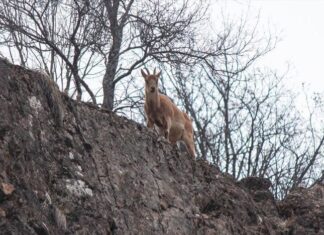Roundthe churchyard a multitude gathered in front of a long low green farmhouse. Theproprietor wept bitterly as he stood in his door-way. He was a fat,jolly-looking man, and happened to arouse the compassion of a few soldiers whosat near the wall in the sunlight, patting a dog. The soldier who was takingoff his child made gestures as if to convey the meaning, “What can I do? I`mnot to blame!”
Onepeasant who was being pursued leaped into a boat near the stone bridge, and,with his wife and children, rowed quickly across that part of the pond that wasnot frozen. The Spaniards, who dared not follow, walked angrily among the reedsby the shore. They climbed into the willows along the bankside, trying to reachthe boat with their lances. Unable to do so, they continued to threaten thefugitives, who drifted out over the dark water.
Theorchard was still thronged with people: it was there, in the pres-ence of thewhite-bearded commanding officer, that most of the children were beingmurdered. The children who were over two and could just walk, stood togethereating bread and jam, staring in wide-eyed wonder at the massacre of theirhelpless playmates, or gathered round the village fool, who was playing hisflute.
Allat once there was a concerted movement in the village, and the peasants madeoff in the direction of the castle that stood on rising ground at the far endof the street. They had caught sight of their lord on the battlements, watchingthe massacre. Men and women, young and old, extended their hands toward him insupplication as he stood there in his velvet cloak and golden cap like a kingin Heaven.
But he only raised his hands and shrugged hisshoulders to show that he was ownerless, while the people supplicated him ingrowing despair, neeling with heads bared in the snow, and crying piteously. Heturned slowly back into his tower. Their last hope had vanished.
Whenall the children had been killed, the weary soldiers wiped their swords on thegrass and ate their supper among the pear-trees, then mounting in pairs, theyrode out of Nazareth across the bridge over which they had come.
Thesetting sun turned the wood into a flaming mass, dyeing the vil-lage a bloodred. Utterly exhausted, the curd threw himself down in the snow before thechurch, his servant standing at his side. They both looked out into the streetand the orchard, which were filled with easants dressed in their Sundayclothes.
Beforethe entrances of many ouses were parents holding the bodies of children ontheir knees, still full of blank amazement, lamenting over their grievoustragedy. Others wept over their little ones where they had perished, by theside of a cask, under a wheelbarrow, or by the pond. Others again carried offtheir dead in silence. Some set to washing benches, chairs, tables, bloodyunderclothes, or picking up the cradles mat had been hurled into the street.
Stopping by Grief- Stricken
Manymothers sat bewailing their children under the trees, having recognized them bytheir woolen dresses. Those who had had no children wandered through thesquare, stopping by grief- stricken mothers, who sobbed and moaned. The men,who had stopped crying, doggedly pursued their strayed beasts to theaccompaniment of the barking of dogs; others silently set to work mending theirbroken windows and damaged roofs.
Asthe moon quietly rose through the tranquil sky, a sleepy silence fell upon thevillage, where at last the shadow of no living thing stirred.
Read More about The Forty-Seven Ronins part 4








